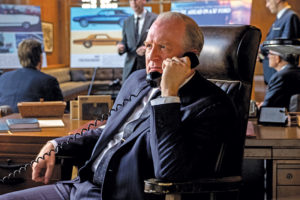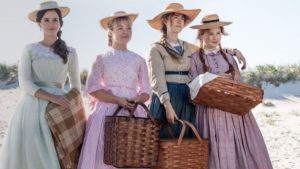Letts chats about his Chicago theater roots, his writing process, his admiration of Greta Gerwig and his thoughts on why everyone should see “Ford v Ferrari” on the big screen.

Tracy Letts is a name you’ve probably heard before however you may not be able to place him on the big screen, until now. The Pulitzer Prize playwright has co-starring roles in two Oscar contender films; “Ford v Ferrari” and “Little Women.” In last years Oscar contending film “Lady Bird” he played Saoirse Ronan’s calm, voice of reason father—in “Little Women” he plays a similar role as Mr. Dashwood editor of the local newspaper who mentors Ronan and her novel writing. “Little Woman” also reunites Letts with director and screenplay writer Greta Gerwig. You might also be surprised to learn he has Chicago roots in the Steppenwolf Theater where he acted and wrote plays for the theater group and premiered his Pulitzer Prize winning play “August: Osage County” in 2008, taking the play to Broadway and winning several Tony Awards. Speaking of Tony Awards, Letts has earned one himself for acting in the 2012 play “Who’s Afraid of Virginia Wolf.”
Letts chats about his Chicago theater roots, his writing process, his admiration of Greta Gerwig and his thoughts on why everyone should see director James Mangold’s “Ford v Ferrari” on the big screen. Viewers of the films should note a scene that had audience members of my Toronto International Film Festival September screening laughing out loud, as Letts (Henry Ford II) is taken for a racecar high speed spin and not prepared for the reality of 100 mph ride. Letts reveals his stellar acting chops, when he goes from pure exhilarating laughter to unexpected tears of terror and joy. I spoke with Letts via phone on December 5, 2019 as he was calling from New York.

Hi Tracy, I want to thank you so much for talking with me today. I so enjoyed your performances in “Ford v Ferrari” and “Little Women.” Congratulations! Since I’m from Chicago, my outlet’s out of Chicago, I’d like to start by talking about your Chicago Steppenwolf Theatre days and playwriting ties. Could you tell us a little bit about those?
Tracy Letts: Do you still live in Chicago?
SKA: I do. I live outside of Chicago. I live in Naperville.
Tracy Letts: Oh, because I still live in Chicago and myself. My family and I live in Bucktown.
SKA: I know right where that is! That’s Wonderful.
Tracy Letts: I love it. It’s a great city. Chicago’s been really great for me. I moved there when I was 20 years old, so I’ve been there over 30 years. It’s just such a great theater town. It’s a great theater town because audiences in Chicago value the work. They value new plays. There’s always been a curious, engaged audience for theater in Chicago. It’s why we have so many theaters, so many different kinds of theaters, big theaters, small theaters, storefront theaters, and it’s just a really healthy ecosystem in Chicago.
I’ve always felt it was the best place for a playwright because you can always get your work done. The gatekeepers are not so strict that they will keep your work off the stage. You can always get your work done. It may be on a very small level, but you get work done, and you’ll get your work seen. Even at Steppenwolf, if we do too many revivals, we’ll hear about it from our audiences, from our subscribers. They want to see new work. That’s why they come to see new work. It’s a great city for new writing and a great city in which to learn your craft.
SKA: Thank you for that. What did winning the Pulitzer Prize for Drama do for you personally?
Tracy Letts: Awards are great and fun. It’s fun to win them. I’ve won some awards, and I’ve also lost some awards. When you get them, it’s great encouragement. It just makes you feel like somebody’s paying attention to what you’re doing. They see what you’re doing, and they’re encouraging you saying, “Keep it up.” So it’s great in that sense. It was deeply meaningful to me. Both my parents were English teachers. Teaching had really been a calling for them. Education had really been the thing that had broken cycles of poverty in their family. There was such a premium place in the written word in our household. Books, literature, reading and writing, movies, TV, and music; all that stuff played such a huge role in our household. So winning the Pulitzer was especially meaningful.
SKA: Thank you for that. From what I can find out through reading, your mother is a writer, and your father is an actor. I was wondering what they may have taught you about either of those crafts, writing or acting?
Tracy Letts: They were both English teachers. They both had remarkable second careers. I grew up in a small town in Southeastern, Oklahoma called Durant. My folks taught at a small college there called Southeastern Oklahoma State University. They were lifelong teachers who took early retirement in their 50s and had remarkable second careers. My mother as a novelist and my dad as an actor. But they’ve both passed away.
They imparted to my brothers and me such a love of, as I said, the written word but also just creative endeavor. They always were interested in creativity, artists, and the life of an artist. I think they were also interested in us getting the hell out of Oklahoma. So the arts really provided an opportunity for that. I think more than anything; they wanted us to find the things in our lives that we were passionate about. The arts were something we could be passionate about.
SKA: How does it make you feel to be able to work in both of the worlds of your parents since you are acting now in film and TV, and of course, you acted on stage in theater in Chicago. Now you’re universal. The world is seeing your work now, Tracy, which is wonderful.
Tracy Letts: I’m incredibly lucky. I feel very grateful for the opportunities I’ve had. My career has been this bizarre, long, slow, steady, uphill climb. It’s been great. I wouldn’t have had it any other way. I think if I had achieved too much success at an early age, I think I’d probably be monstrous. But I think because things have come along as they have and there’s just been a very gradual progression to both careers, both as an actor and as a writer. I think I’ve always kept a little perspective. So I’ve always been able to just keep my head down and focus on the work. That’s another great thing about Chicago. It’s not a town that values a lot of pretension. What it values is a work ethic.
SKA: I agree with that.
Tracy Letts: You stay humble, and you just keep going.
SKA: So getting to the two movies here. Your scenes in “Ford v Ferrari” are very powerful. Oh, by the way, I loved both of the films that we’re speaking about today. What did you take away from playing such an iconic figure as Henry Ford II?
Tracy Letts: It was great fun. The script was great fun. James Mangold is a great filmmaker. He makes really entertaining movies. He has a real ethos about making entertainments that he wants and expects his movies to entertain. It was very clear on the page; that’s what the movie was set out to do.
I appreciate your comments about the movies because it’s so nice to have two movies that I can just recommend to anybody. I don’t have to say, “Well, you will like it, but you won’t.” I can just say to anybody, “Go see both of these movies. They’re both great. They’re both a lot of fun. You’ll have a great time.”
SKA: Yes, I totally agree with that. That’s just awesome. Yes, everybody will love both of them. Just wonderful. In “Little Women,” you play Mr. Dashwood. Could you talk a little bit about your character? I just loved your character. He was almost like a mentor. If you could talk a little bit about that, take?

Tracy Letts: Again, it comes back to the script. Greta’s script is so great, so beautifully wrought, and it’s so contemporary. I love what she did with Mr Dashwood. The idea that he frames the film. I get asked to play a lot of these characters who are… they’re gatekeepers. Our protagonist has to go through me to get to what they want and I love playing those parts. They’re great fun to play. I look for the thing about them that makes them interesting, more human, or more vulnerable.
Tracy Letts: The thing I loved about Dashwood was that it was clear from Greta’s script that he has some affection for Jo. He’s conducting his business, and he’s making valid points, but he actually has some affection for her and some understanding that “Oh, she’s got something.” So he does cross the line from gatekeeper to mentor a little bit. I loved it.
SKA: It’s such a beautiful movie, “Little Women.” As you said, it’s just such a fresh take on the book and the films that come before it. How did you react when you first saw it in the movie theater for the first time or when you first did really see the whole thing?
Tracy Letts: My wife and I saw a screening that was here in New York. Meryl Streep actually hosted the screening. I think the rest of the cast, they were all doing publicity out in LA. So Meryl and I were the only people from the movie who were at the screening. It was a screening for about a hundred people. The movie started, and Carrie, my wife, and I sat and just cried for two solid hours. We cried all the way through it. It’s so gorgeous.
SKA: Oh, my goodness!
Tracy Letts: It’s so deeply moving. People are really going to love this movie.
SKA: I agree. I can’t wait. I’m going to review it for the radio and write all about it. I love it. I’d like to ask you as a writing expert, how do you know when a character is fully formed when you’re creating one?
Tracy Letts: How do I know a character’s fully-formed? I don’t know it until an actor has taken it on and an actor has started to fill it out with their own personality, their own quirks, their own contribution. Once an actor has started to flesh it out it starts to take on a different life. I say about all of my plays, none of them wind up looking the way they look in my head, they’re always better. I have a vision of what it’s going to be in my head, and actors get up there, do it, and it’s so much better than I thought it was going to be because they bring so much life and personality to it. It’s why I’m a playwright. If I didn’t think that I should be a novelist; but the truth is all my plays have benefited from the wonderful actors who have played my different roles over the years.
SKA: That’s so wonderful. That’s the background I came from teaching. Collaboration I feel is really the way of the world. Two ideas are better than one usually. I think that’s wonderful. What suggestions do you have for writers that are honing possibly their scripts or their novels? Trying to make their craft better?
Tracy Letts: The suggestion I would have first of all is if you’re writing a script, whether they’re screenplays or plays, you have to hear them. You have to have that experience of having actors perform them. A script is a blueprint for a production or a film. It’s just a blueprint, and it doesn’t start to become a real thing until somebody is there filling it out. Then my other suggestion would be self-produce. Don’t wait for somebody to say, “Yeah, I’ll do that.” Do it yourself. Make it yourself. There’s no excuse now with the technology being what it is not to make it yourself.
Tracy Letts: You can make it on your iPhone, and people have. Then after you’ve made it on your iPhone you can email it to somebody. That’s what the technology allows for now, so you should absolutely be doing that. In terms of novels, that’s a different world. I don’t know. I would say just keep writing and rewriting, and just keep trying to get it in the hands of somebody who can help you with it. You are in fact, the captain of your own ship, but you’re going to have to have somebody else. Mr. Dashwood’s going to have to say at some point, “Yeah, I’ll take this.”
SKA: As a film critic, I’ve been following your film career, and it’s just been so great because we, the critics, we talk and we’re like, “Oh my gosh, did you see Tracy Letts in this TV show? Did you see him in “Homeland?” Which I love. “The Big Short? “The Lovers?” And, “Lady Bird.” Oh my goodness. What I’m seeing is you have a love for acting as well. Can you talk about acting, how you feel about that and why maybe you enjoy it so much? Because I don’t think you’d keep doing it if you didn’t enjoy it. You’re a very talented person.
Tracy Letts: I love doing it. I love acting. Especially after being a writer, it’s so freeing as an actor that you only have to worry about your one little part. The writer has to worry about so much.
SKA: Yes, that’s so true.
Tracy Letts: The actor only has to worry about playing that one little role. It’s so much fun. I had gone to LA for a few years in the early 2000s to try and get work as an actor and it really had not panned out for me. I went back to Chicago and I took a vow of poverty. I was like, “Okay, I’m just going to work in Chicago theater because it’s what I love to do.” I wrote “August: Osage County,” and the vow of poverty went out the window.
Tracy Letts: That led to “Who’s Afraid of Virginia Wolf”. Then when I did “Who’s Afraid of Virginia Wolf,” Alex Gansa, who created the American version of “Homeland,” he saw the show and asked me to play that part. So I’ve had this remarkable second, third or fourth career in the last few years of working in film and TV. It’s not something I ever expected was going to happen for me. Again, I think I was all right with that. I wasn’t sitting around bitter about the fact that things weren’t working out. I won a Pulitzer Prize.
Tracy Letts: The fact that this weird next career came my way really took me by surprise. But it’s been great fun. I’ve met such wonderful people. I’ve had a good time, gotten to travel, and been part of some projects I’m really proud of.
SKA: Can you ever be proud of those? My goodness. I just have one last question. What would you like to say to people about “Ford v Ferrari” or “Little Women?”
Tracy Letts: Just what I said to you, which is that you should go see them and you should see them in a movie theater. “Ford v Ferrari” especially. That movie is made to be seen on a big screen. It’s an old fashioned kind of movie. I’ve had more than one person say to me, “This is the kind of movie that my parents took me to when I was a kid.” There wasn’t so much children’s fair back then. There weren’t all these kids’ movies around. So we went to see the movies that our parents wanted to see, that they thought were right for us to see. So I was the last generation of people. For instance, we went to see the new John Wayne movie. Ford v Ferrari is very much that kind of movie. It’s the movie that parents took us to when we were kids. I think it does deserve to be seen in a movie theater.
SKA: Thank you so much for your time and best of luck with both films. I can’t wait to keep watching you in the future.
Sarah Knight Adamson © December 5, 2019
